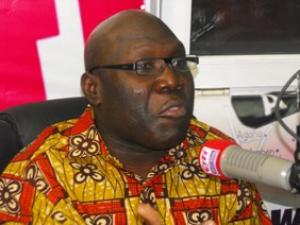 Cabinet will soon approve a memorandum that will prescribe severe punishment for illegal miners in Ghana, Alhaji Inusah Fuseini, Minister of Lands and Natural Resources has revealed.
Cabinet will soon approve a memorandum that will prescribe severe punishment for illegal miners in Ghana, Alhaji Inusah Fuseini, Minister of Lands and Natural Resources has revealed.
After the approval of the proposed amendments, which has become necessary in the era of increase in illegal mining, Cabinet will later submit the memorandum to Parliament.
“The proposed amendments will ensure strict liability for offenses committed under existing Minerals and Mining Act 703 of 2006 and prescribe severe penalties for illegal mining or galamsey”, the Minister said.
Speaking at the opening of the 2014 Executive Short Course in Mining Law and Policy being run for the first time by the Faculty of Law, University of Ghana (UG), Alhaji Fuseini explained that with the amended law, the courts would be empowered to confiscate equipment used in illegal mining as well as any minerals produced from such activities.
The mining law and policy course being attended by 24 representatives of stakeholders including judges, lawyers, traditional rulers from mining communities, representatives from Chamber of Mines and members of civil society groups is getting financial support from the Australian Government.
The Australian government is supporting the collaboration between the Law School of the University of Ghana and the University of Australia to develop the mining law and policy being aided by the International Mining for Development Centre.
The sector Minister said because mining in Ghana had gone through many changes since the first Europeans arrived in the country in 1471, there was the need to adjust Ghana’s mining laws and policies to accommodate changing circumstances.
He therefore, commended the two universities for instituting the executive short courses in mining law and policy that would enable participating students to study mining laws of other minerals endowed countries.
Joanna Adamson, the Australian High Commissioner, said since the mining sector played an important role in driving economic growth, such an improved awareness of mining law and policy programme “will help this process.”
“Australia is pleased to be drawing on its expertise to support Ghana in its efforts to achieve sustainable and equitable development,” she said.
She disclosed that her government was assisting Ghana and other African countries to harness their resources to stimulate economic growth and return the benefits to their people.
Professor Kofi Quashigah, Dean of Faculty of Law, UG said the Executive-level course contains a curriculum that draws on Australia’s reputation as a leading nation for mining innovation and legal expertise and incorporates the University of Ghana’s reputation for academic excellence.
According to him, the week-long course will be run in three series after which it would be developed into an LLM for post graduate students who want to learn about mining law in Ghana at the faculty.
“This Faculty wants to strengthen the post graduate LLM to make it more relevant and attractive,” he said.
Professor Ernest Ayittey, the Vice Chancellor, UG said with such programmes, the University was repositioning itself to lead the future to help in the transformation of the country to ensure that “we sustain the change we want as a country.”
Professor Nii Ashie Kotey, Coordinator of the Executive Course, said the programme aimed to provide a good overall introduction on how mining operates in Ghana and also explore the relevant policies, and how they affect mining activities and people.
Participants will also discuss the best ways to manage the resources in a sustainable manner for the benefits of Ghana as well as network.
Source: GNA


